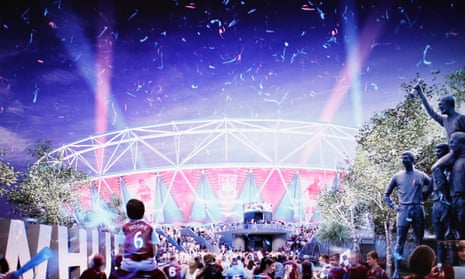West Ham United have won the lottery, according to Arsène Wenger, having been granted the 60,000-seat Olympic Stadium from the beginning of next season.
The Arsenal manager’s favourite triumph-over-adversity story is the one about how his club funded and built the Emirates Stadium, into which they moved in 2006 while consistently qualifying for the Champions League to bring in essential revenue.
Wenger estimates Arsenal lived under financial constraints for six years while the Emirates project was realised, at a cost of £390m but West Ham have been able to take a short cut he believes can help to make them regular contenders for the Premier League’s top-four.
West Ham agreed to pay a one-off fee of £15m towards the Olympic Stadium conversion costs and a rent of around £2.5m a year. “I say to West Ham: ‘Well done. You have won in the lottery and you do not need to sweat like I did for long years, and fight for every pound’,” Wenger said, before Arsenal’s game against West Ham at Upton Park on Saturday lunchtime. “So it’s very well done.
“They have made a good deal, they have negotiated very well. It was a fight with Tottenham [for the Olympic Stadium]. For me, it is similar to the Man City situation [when they were granted the Commonwealth Games stadium in 2003]. Man City got a new stadium for £20m, basically.”
City had finished the 2002-03 Premier League in ninth place under Kevin Keegan, having been promoted from the Championship the previous season but they began to emerge as a powerhouse club after they were taken over by the Abu Dhabi United Group in 2008.
Wenger believes West Ham could in time be bought by foreign owners and follow a similar path to that of City, although it was announced in 2013, when they were awarded the Olympic Stadium, they would have to pay a one-off windfall back to the London Legacy Development Corporation if they sold the club within 10 years.
“It is possible,” Wenger said. “When you look 20 years back to when I arrived, the number of owners were all local. If you look at how that has changed in 20 years, then you think West Ham could go the same way.”
Wenger expects West Ham, who have enjoyed an excellent season under Slaven Bilic and are seven points behind Arsenal in sixth place, will form part of an altered football landscape in London, where Tottenham and Chelsea are also progressing plans for new stadia. Tottenham intend to move into theirs in 2018-19 while Chelsea could follow suit a couple of years later.
“Will West Ham be rivals in the future? Of course,” Wenger said. “I think it will change. Tottenham will go the same way – they will create, as well, a 60,000 seat stadium and they will be followed by Chelsea. That gives more resources to everybody and will make the league more competitive.”
The period of relative austerity caused by the Emirates Stadium build is imprinted on Wenger; the stress of it has shaped him. “I could say the first six years were very difficult financially,” Wenger said. “Going into April and thinking if you are not in the Champions League, you are in trouble – that has been absolutely super-difficult.
“Yes, West Ham don’t go through the pain. They have taken this opportunity and taken it very well. Is it fair? I leave you to that statement. Is it fair, is it not fair? It is legal.”
